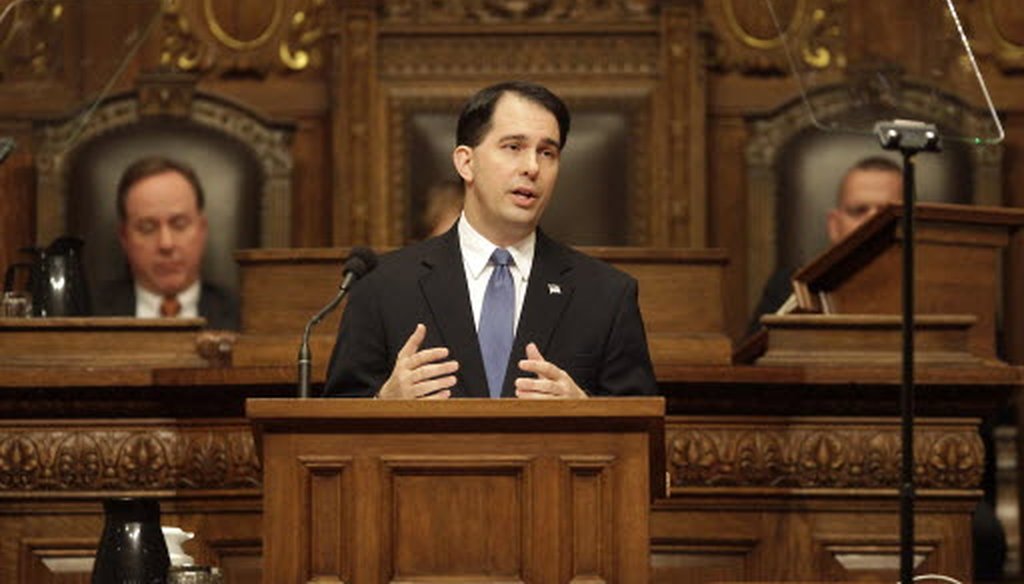Get PolitiFact in your inbox.

Gov. Scott Walker addressing legislators on his biennial budget on Feb. 20, 2013
Gov. Scott Walker argued in his Feb. 20, 2013, budget address that Wisconsin’s economy is turning around, state government finances are under control and the state can afford tax cuts for the middle class.
Democrats hit back at the governor’s portrayal, citing economic distress and budget deficits.
Let’s shed some light on the claims and counterclaims, with help from past Truth-O-Meter items, Journal Sentinel analysis, the public record and a look at details in Walker’s 2013-’15 budget.
Jobs and Wages:
Walker focused on the drop in the unemployment rate during his two years. He accurately noted its decline from 7.8 percent to 6.6 percent.
During the speech, Democratic Party of Wisconsin spokesman Graeme Zielinski tweeted a volley of economic claims.
He said that under Walker, Wisconsin ranks 42nd in job creation, behind Alabama, and that wages are going down.
The Journal Sentinel reported in January 2013 that Wisconsin ranked 42 out of the 50 states in private-sector job creation, citing the latest available government jobs data deemed credible by economists.
Alabama was indeed slightly higher than Wisconsin, at 41st.
"The data, which covers the 12 months from June 2011 to June 2012, shows that Wisconsin's position worsened from a rank of 37 in the previous period from March 2011 to March 2012," the newspaper’s story said.
The assertion that wages have fallen on Walker’s watch does not hold up, at least when viewed broadly across all sectors of Wisconsin employment.
Average weekly wages rose 2.6 percent in Walker’s first year, 2011, compared with 2010, according to U.S. Bureau of Labor Statistics data. Preliminary results for the first half of 2012 (the latest data) are not conclusive. Zielinski conceded his tweet was off, saying he was thinking of an income-inequality study of several years that, we found, pre-date Walker’s era.
Tax Burden and Property Tax
Walker said, "We reversed the trend in Wisconsin in the last budget when we lowered the overall tax burden."
We confirmed that in a Truth-O-Meter item in January 2012, concluding that Walker’s first budget had a net $34 million tax reduction, mainly through business tax breaks. His plan included $83 million in tax cuts, according to the Legislative Fiscal Bureau, but that was offset by $49 million in tax increases.
In his latest budget speech, Walker said that in each of the past two years, property taxes on a median-valued home "actually went down."
That’s true for his first year, as PolitiFact Wisconsin reported. That’s been confirmed by the independent fiscal scorekeeping agency, the Legislative Fiscal Bureau. Walker’s administration says it’s true for his second year, too, based on a projection made from extensive, but incomplete, data.
The estimated drop on that median home -- 0.4 percent in 2011, 0.6 percent in 2012, does not mean that every homeowner saw the bill go down, just that a hypothetical "average" owner did.
What about the next two years, under Walker’s new budget plan? The Journal Sentinel reported that "under the budget, property taxes for the median value home in Wisconsin would rise to a projected $2,959 in December 2013, an increase of $24, or less than 1%, with a similar increase expected for tax bills to be sent out in December 2014."
Surpluses and Deficits
Walker emphasized that his first budget actually is running a surplus, and he linked his administration’s frugality to the declining unemployment rate.
But Zielinski, the Democratic Party official, said a big deficit hangs over Walker’s new two-year budget plan.
They are both right, for somewhat different reasons.
Walker’s 2011-’13 budget is running a small surplus.
But his proposed 2013-’15 budget will be in the hole by $2.64 billion by the end of its second year, as page 33 of his budget summary shows.
The projected deficit is based not on traditional governmental accounting, but on private-sector GAAP accounting, which Walker in his 2010 campaign had promised to use to truly balance the budget. We gave him a Promise Broken on the Walk-O-Meter for not doing so.
The Journal Sentinel reported that using more comprehensive accounting practices, the state GAAP deficit would grow to $2.64 billion from $2.06 billion, an increase of 29% over two years.
The GAAP number is briefly mentioned in the budget book every year. The governor is under legal obligation to present a balanced budget according to the traditional accounting, and Walker has done that.
Our Sources
Gov. Scott Walker’s 2013 Budget Address, as prepared for delivery, Feb. 20, 2013
Milwaukee Journal Sentinel, "Scott Walker’s budget to lower income tax rates, freeze local aid," Feb. 20, 2013
@gjzielinski, tweets on Scott Walker budget speech, Feb. 20, 2013
State of Wisconsin, "Budget in Brief," February 2013
Wisconsin Department of Revenue, "Governor Walker’s Tax Reform Initiative,"February 2013
PolitiFact Wisconsin, "Gov. Walker says for the first time in 12 years property taxes fell on a median-valued home," June 1, 2012
PolitiFact Wisconsin, "Gov. Walker says he eliminated Wisconsin’s $3.6 billion budget deficit without raising taxes," Jan. 29, 2012
Walk-O-Meter, Promise on requiring use of accepted accounting principles to balance state budget, updated Nov. 16, 2011
Milwaukee Journal Sentinel, "State ranked 42nd in job creation at mid-year, census report shows," Jan. 8, 2013
Interview with Fred Ammerman, property tax program supervisor, Wisconsin Legislative Fiscal Bureau, Feb. 21, 2013















































